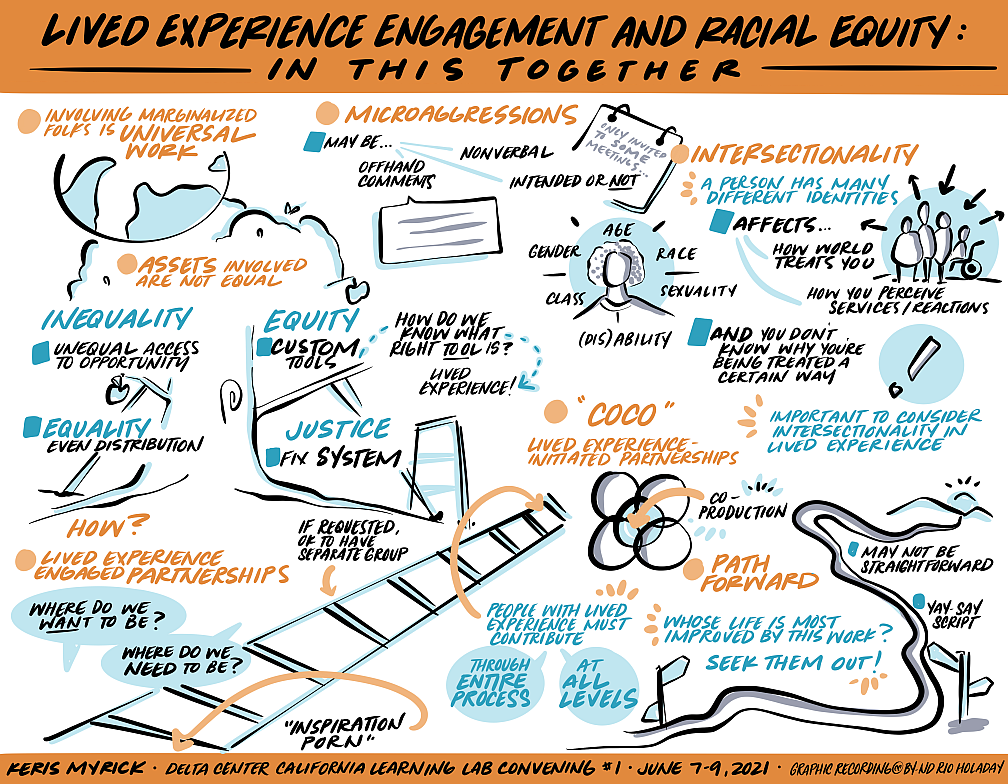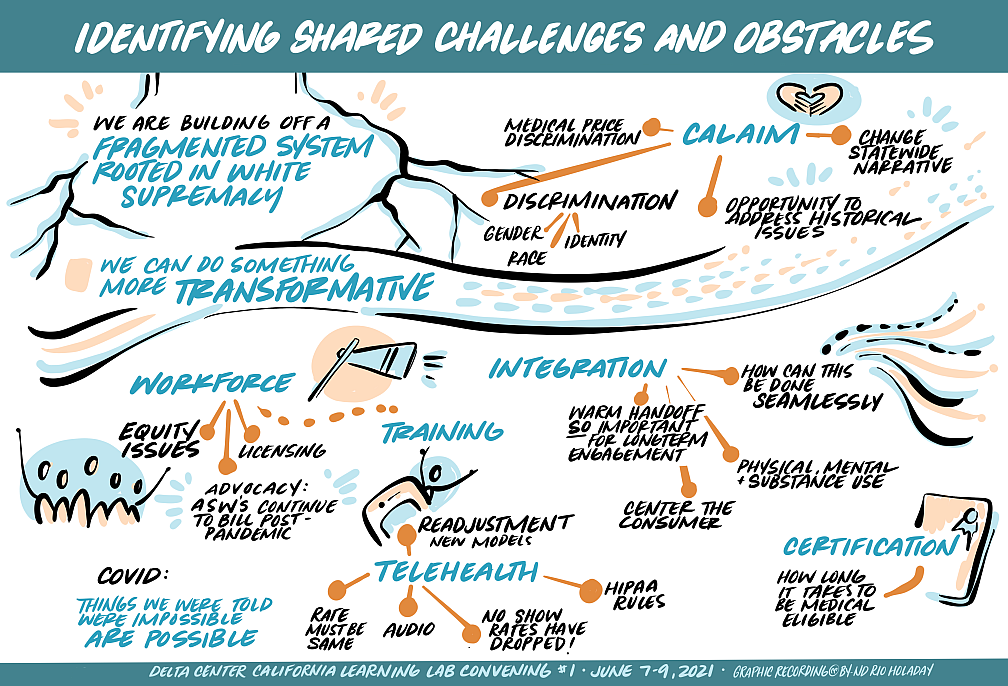

Convening 1 Summary
On June 7th-9th, 2021, Delta Center California held its first convening, bringing together Local Learning Teams and the State Roundtable for shared learning and relationship building. During the three-day virtual convening, participants came together to learn about each other’s project goals and challenges, discuss policy priorities, and build a shared understanding of racial equity, engaging individuals with lived experience, and behavioral health and primary care integration.
The learning objectives for the convening were the following:
- Build foundation for peer learning through relationships, trust, and an environment of sharing and safety
- Identify effective ways to center lived experience in project work
- Prioritize Learning Lab areas of focus and support in Action Period 1 (July - November 2021)
- Understand the importance of race and intersectionality in lived experience
- Share project team goals and challenges with colleagues
- Build energy and enthusiasm to move this work forward
- Strengthen partnerships within teams and advance project action planning
Below, we summarize speaker presentations and three key themes from the convening. Learning Lab Teams and coaches will continue to explore these themes collaboratively over the next 16 months.

Centering Lived Experience
In alignment with the goals of Delta Center California, a central focus of the convening was the importance of centering lived experience and racial equity in project work. To learn more about these topics, participants heard from Keris Myrick, a leading mental health advocate in California, Director at the Jed Foundation, and Co-Director of The Mental Health Strategic Impact Initiative (S2i). In her presentation, Ms. Myrick introduced the phrase “Co-Co’s” to describe the journey of creating lived experience-initiated partnerships. The Co-Co’s require involving people with lived experience throughout the process of co-planning, co-design, co-delivery and co-evaluation to implement an equitable program or policy. Ms. Myrick also stressed the importance of intersectionality in this work, explaining that “all parts of someone’s identity affect the way they perceive the services they receive as a client and how the world treats them when they show up.”
Ms. Myrick presented her Lived Experience-Engaged Organization Ladder, which describes different levels of engagement of people with lived experience in a project or organization. By using the ladder to reflect on their Learning Lab project, teams were able to think about how to best expand their engagement strategies in meaningful ways. Many teams were at the juncture of involving people with lived experience to offer input, but not at a leadership level. When asked how to approach moving to the next level, Ms. Myrick suggested sharing leadership responsibilities so everyone has opportunities to participate, which leads to a greater sense of ownership among the entire group. Ms. Myrick also advocated for building the leadership capacity of people who are marginalized; “Building their capacity means you’ll have more people in the future who have those skills.”
Each Learning Lab Team developed three commitments to facilitate lived experience engagement and address racial equity in their Learning Lab project. When reflecting on the convening, multiple participants noted that they learned the importance of centering lived experience and want to think more about how to incorporate the experiences and perspectives of the people they serve into their project work. One participant noted, “It would be great to circle back on these ideas throughout our time with Delta Center CA, to ensure that we are truly incorporating the suggestions. It would also be good to hear how others are incorporating these suggestions in their own projects.”
Strengthening Partnerships
Throughout the three-day convening, Learning Lab Teams had time to strengthen existing partnerships within their teams, and build relationships with members of other teams. Teams participated in small group discussions and “get-to-know-you” activities, and had dedicated time to continue building their own team partnerships and work on action planning for their projects. Teams also participated in a shared coaching session with their coach and one other team, where they highlighted challenges and discussed strategies for overcoming them.
In addition to these discussion opportunities, each team presented to the entire cohort on the history of their partnership, the people they serve, their goals for participation in the Learning Lab, and their team mascot. The team presentations galvanized the group to think about where there might be intersections between their projects, experiences, and challenges. For example, after one group shared their goal of incorporating Sexual Orientation, Gender Identity, and Expression (SOGIE) data into their EHR, another team wrote, "We look forward to hearing about your best practices. Our Electronic Health Record has a robust SOGIE section, but we have a ways to go to get that information in.” Other teams reached out to offer support for challenges shared during the presentations, sending messages such as, “These are noble goals and wish you much success. How can we help?” and “We are trying to start serving that population as well. We look forward to learning with you.” It was inspiring to see cross-team support and peer learning happening so quickly in the first convening.
Another poignant moment was when one team shared how the people they serve would describe themselves. The team works with individuals with severe mental illness who are in a residential treatment facility, most of whom have experienced homelessness and justice system involvement. Yet when they asked their clients how they would describe themselves, the individuals responded with adjectives such as “good looking, romantic, funny, good, happy, kind, optimistic, and patient.” This vignette was inspirational, and exemplified how a team might authentically center the stories of the people they serve.
Bridging Policy & Practice
On the third day, the Learning Lab Teams and State Roundtable members came together for a shared session to learn about the State Roundtable policy priorities (telehealth and workforce) and the policy barriers faced by the Learning Lab Teams. Common challenges and frustrations noted by Learning Lab teams in breakout groups included payment system fragmentation and workforce challenges.
Payment system fragmentation, complexity, and sustainability were common challenges among convening participants, in part because behavioral health has not traditionally been included in the medical insurance model and in part because of the complexity of California’s public healthcare payment system (which includes both state- and county-level payment systems). It was noted that conversations about improving health systems to-date often focus solely on physical health, and reimbursable services have focused on the traditional medical model, which doesn’t always effectively address behavioral health needs (e.g., housing could be the most effective intervention). As a result of these intersecting challenges, behavioral health leaders are required to spend significant time seeking funding for services, rather than supervising and training clinical staff. Lastly, of note, Learning Lab Teams discussed the negative impacts of Medi-Cal price discrimination that can result in lower reimbursement rates for community-based organizations providing mental health services, which in turn can impact their provider recruitment and retention.
Teams also discussed how the current payment systems creates barriers to care coordination given that (1) behavioral health and primary care services are often not reimbursable if they occur on the same day; (2) specific provider types are not billable in certain settings (e.g., ASWs and LMFTs in FQHC settings); and (3) payment is fragmented across the continuum of care from a patient/consumer perspective. Teams also noted that recruitment and retention are critical challenges and staffing shortages are sometimes exacerbated by licensure requirements (e.g., many candidates are not licensed yet, and non-licensed providers must be supervised).

“The session regarding policy challenges was extremely valuable. It was great to share the policy barriers that we are struggling with on a daily basis and to witness that other groups are also experiencing the same challenges.”

Looking Ahead
The first Delta Center California convening sought to build enthusiasm around project work and relationship building. Participants left with a sense of optimism that the group will be able to make real change over the course of the Learning Lab. When reflecting on what they would take away from the convening and bring to their work, one participant noted that they would remember “the power of collaboration that was demonstrated during the convening. Working together with some give/take moves projects forward and improves outcomes.” Another participant reflected on the hope they have for the future of California’s care systems, writing, “Seeing a system that is much easier to access, has a full array for ALL, and parity in behavioral health and physical health outcomes. This would be reflected in policies, regulation, funding/payment structure, reimbursement rates, and workforce expertise.”
Moving forward, the Learning Lab Teams will continue working on their projects independently and with help from their coaches, via regular coaching calls and action planning. Additionally, Delta Center California will be hosting three Virtual Learning Events for the teams between September and December 2021. These events will provide a venue for ongoing learning on shared topics of interest, as well as collaboration with the State Roundtable on policy priorities. There will be two additional convenings as part of the Learning Lab, the next one in early 2022 and the final one in Fall of 2022.

I will remember "the power of collaboration that was demonstrated during the convening. Working together with some give/take moves projects forward and improves outcomes.”

I hope to “see a system that is much easier to access, has a full array for ALL, and parity in behavioral health and physical health outcomes. This would be reflected in policies, regulation, funding/payment structure, reimbursement rates, and workforce expertise.”